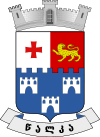Zalka
|
Zalka წალკა |
|||
|
|||
| State : |
|
||
| Region : | Niederkartlien | ||
| Municipality : | Zalka | ||
| Founded : | 1829 | ||
| Coordinates : | 41 ° 36 ′ N , 44 ° 6 ′ E | ||
| Height : | 1,450 m. ü. M. | ||
| Residents : | 2,326 (2014) | ||
| Time zone : | Georgian Time (UTC + 4) | ||
| Community type: | city | ||
|
|
|||
Zalka ( Georgian წალკა , Armenian Ծալկա , Greek Τσαλκα / Tsalka ; Russian Цалка ) is a city in southern Georgia , in the Lower Kartli region (Kwemo Kartli) . It is the administrative seat of the municipality of the same name Zalka and has about 2326 inhabitants (2014).
Until the beginning of the 1990s, the majority of Greeks lived there, but large numbers of them have emigrated since then. To this day, ethnic Georgians are in the minority compared to other ethnic groups in the city and its surroundings . As the most important population group in the past, the Greeks have now been replaced by the Armenians , but their share is still around 22% today.
location
The place is located in the southern central part of Georgia about 60 kilometers as the crow flies west-southwest of the capital Tbilisi on the southern edge of the Zalka plateau in the Trialeti mountain range, which is 1500 m to 1700 m above sea level . Immediately north of the city, the Kura tributary Chrami is dammed up to the Zalka reservoir and leaves the lake first flowing through the city in a south-easterly direction through a narrow gorge.
history
The founding year is 1829, when the authorities of the Russian Empire allowed Pontic Greeks and Urum from the Ottoman Empire to settle there. These Greeks came from areas of the Ottoman Empire which had been conquered by the Russian army in the Russo-Turkish War of 1828–1829 , but which fell back to the Ottoman Empire after the Peace of Adrianople . The Greeks first founded Baschtascheni , five kilometers northeast of today's Zalka, and shortly afterwards a number of other places, including the village of Barmaksisi (Georgian name form ბარმაქსიზი, from Turkish Barmaksız ) in place of today's Zalka .
In connection with the construction of the Zalka reservoir and several hydropower plants on the Chrami from the 1930s onwards, the village became the logistic center for construction, renamed Zalka in 1932 and elevated to an urban-type settlement . After the settlement of various industrial companies (mechanical engineering, textile and food industry, construction industry) and the start of construction on a railway line , the city was granted city rights in 1984.
Towards the end of the 1980s, and especially after the collapse of the Soviet Union , a significant part of the Greek population in the area and the city of Zalka emigrated to Russia (primarily to the North Caucasus ) and Greece in the 1990s . The population of the city fell to less than a quarter by 2002 compared to 1989; the proportion of the Greek population in the Rajon (corresponding to today's municipality) Zalka from 61% to 22% (Armenians 55%, Georgians 12%, Azerbaijanis 10%). Instead of the Greeks, a smaller number of Georgian refugees from Abkhazia and South Ossetia came to Zalka and the surrounding area, which is considered one of the most inhospitable Georgia due to its high, relatively poor location. There is the idea of compensating for the population decline by settling the "Meshetian Turks" from the Central Asian successor states of the Soviet Union, whose ancestors were deported from the Georgian SSR in 1944 .
- Population development
| year | Residents |
|---|---|
| 1959 | 7065 |
| 1970 | 5819 |
| 1979 | 6245 |
| 1989 | 8043 |
| 2002 | 1741 |
| 2014 | 2326 |
Note: 1959–2002 census data, 2009 calculation
Culture and sights
A church from the 19th century has been preserved in Zalka. There is also a bust of the classical Greek philosopher Aristotle in the place .
Economy and Infrastructure
The industrial plants that arose in the Soviet period are out of order. The Zalka reservoir north of the city is used to generate electricity.
The railway line running through the city, which branches off the Tbilisi - Gyumri - Yerevan line at Marneuli and leads to Akhalkalaki , whose construction began in the 1980s, was only able to start regular operations after 2000 due to political and economic difficulties. It is planned to expand it as part of the Kars – Baku railway project . The road from Tbilisi to Akhalkalaki near the Turkish border also runs through Zalka.
Individual evidence
- ↑ Population Census 2014 ( Memento of the original from September 20, 2016 in the Internet Archive ) Info: The archive link was inserted automatically and has not yet been checked. Please check the original and archive link according to the instructions and then remove this notice.
- ↑ Aleksandr Tombulidis: Naša Zalka - 174 goda. in: Grečeskaja gazeta No. 8/2003 ( Our Zalka - 174 years old in the Greek newspaper ; Russian)
- ↑ Report at regnum.ru from May 12, 2006 (Russian)
Web links
- Article Zalka in the Great Soviet Encyclopedia (BSE) , 3rd edition 1969–1978 (Russian)



